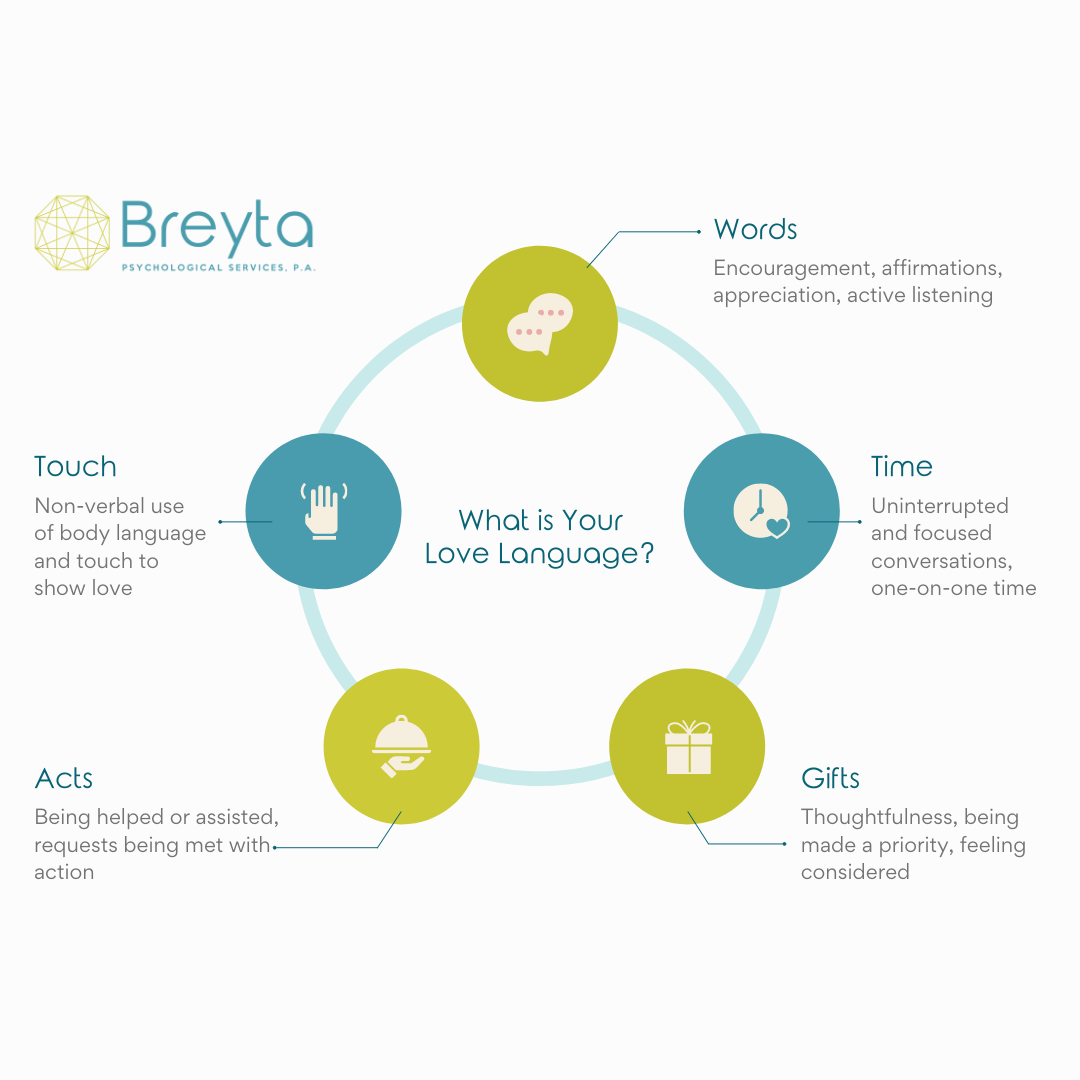Learn How to Speak the Language of Love to Improve Your Relationship
/Did you know there’s a simple way to enhance the interactions between you and your partner or spouse? It’s as easy as taking a quick quiz to learn what your “Love Language” is.
When you have this clarity and can also learn your partner’s, actions tend to translate more meaningfully, helping you both “feel the love”. Read on for a brief overview to get you started.
Words, touch, actions, quality time, and gifts are all ways we can give and receive love.
What Is Love Language?
The Five Love Languages, originally identified by Gary Chapman, have become a popular method for learning more about how we like to give and receive affection. Accurately identifying your own love language can increase the odds that you will feel fulfilled and that you needs will be met in relationships. Similarly, learning about what feels meaningful to your partner can help you feel more capable and ready to meet their needs, as well as result in more overall relationship satisfaction.
Imagine your partner doing the things that really “work” for you without you having to ask all the time. Imagine being able to feel confident in the knowledge that you know what to do for your partner in order for them to feel like you “get them”. What an amazing, caring scenario that would be.
Well, the good news is that it is easily achievable.
Take the Love Language Quiz
You can take the love language quiz online here to discover your ideal form of affection. For a quick overview, check out our helpful diagram.
What Are the Specific Love Language Types?
Each of the Five Love Languages speaks to a different element of fulfilment and need. You may find that there is more than one that feels very important to you - and that is perfectly okay. While all of the languages matter, if you are enacting one, but your partner really prefers another, you won’t get the emotional result you may have hoped for. That’s why it’s important to identify what matters most to you and to your partner.
Acts of Service
For individuals that deem this language most important, they prefer their partners to “show” them they care rather than “tell” them. The old adage “actions speak louder than words” definitely applies here. Examples of this might be bringing your partner a cup of coffee, doing a household chore, or helping them with something on which they are working.
Receiving Gifts
Who doesn’t love presents? Don’t be fooled by this love language - it actually has a deeper meaning than just receiving things. What really matters here is the time and consideration it takes to procure a gift. It feels good when a partner thinks about what their mate may like or need and then exerts effort to make it happen.
Quality Time
For those who deem this most important, they value their partner’s undivided attention and focus. This means that the time spent together is devoted to your partner and the relationship rather than just being in the same place at the same time. Intentionality is key here.
Words of Affirmation
Sometimes we like to hear how much our partner appreciates us, or hear complimentary and supportive words. For those who prefer this category, words never get old. Examples may be, “I love you,” “You are so important to me,” “I’m grateful for you,” or “I really appreciate how you ______.”
Physical Touch
Physical touch can be an important aspect of all relationships. For individuals who prefer this category, it is paramount to them in order to feel loved. It’s important to note that touch should be consensual and may not necessarily even be sexual in nature, though it certainly could be. For example, holding hands, giving hugs, sitting close enough to touch, giving a massage, or initiating physical intimacy may all be very meaningful to you or your partner.
Share What You Learn
Once you have more clarity on what your Love Language is, share it with your significant other. It is vital to note that, even though these categories may seen fairly straight forward, each individual will have their own preferences and interpretations within them. Understanding what each category means to a person and how they prefer that concept to be enacted or expressed is the final step in learning to speak Love Languages.
Remember, the most important piece of the puzzle is communication. If you express your preferences to your partner, and vice versa, it increases the likelihood that each of you will feel fulfilled and loved.














